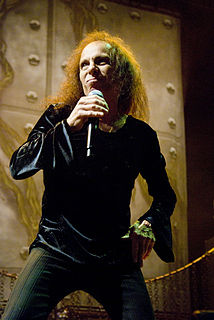A Quote by Rick Warren
You didn't create yourself, so there is no way you can tell yourself what you were created for.
Related Quotes
When you love someone more than he loves you, you'll do anything to switch the scales. You dress the way you think he'd like you to dress. You pick up his favorite figures of expression. You tell yourself that if you re-create yourself in his image, then he'll crave you in the same way you crave him.
You can control yourself if you really want to. I'll tell you how I know you can control yourself. If you were in a full fledged emotional temper tantrum in your house and I knocked on your front door..... Come on! Let me tell you what, you would get control of yourself, and it would only take a few seconds.
No matter how public your work is, it's just a relationship with yourself. And you have to create a little sacred space inside yourself to treasure that... because when you die, that's still what you have. It's what you're born with and what you leave with. It's kind of a story of the way you accompanied yourself through your life.
A cultivated style would be like a mask. Everybody knows it's a mask, and sooner or later you must show yourself -- or at least, you show yourself as someone who could not afford to show himself, and so created something to hide behind. You do not create a style. You work, and develop yourself; your style is an emanation from your own being.
If you walk into a room and one hundred people say, 'You are a lovely, beautiful person', who isn't going to be affected by that? But you have to tell yourself not to value that. You have to tell yourself - or at least I do - to not become accustomed to hearing applause in any way, because I think that's dangerous.
One of the most common words in the invalidating, self-blaming stories we believe about ourselves or our situations is the word "should." The psychologist Albert Ellis has coined the phrase "Stop shoulding on yourself." When you tell yourself that you should feel or be another way, you are likely to feel bad about yourself. As an alternative, try telling yourself that it is okay to feel or be the way you are, even though you have some idea that you should feel or be different.






































